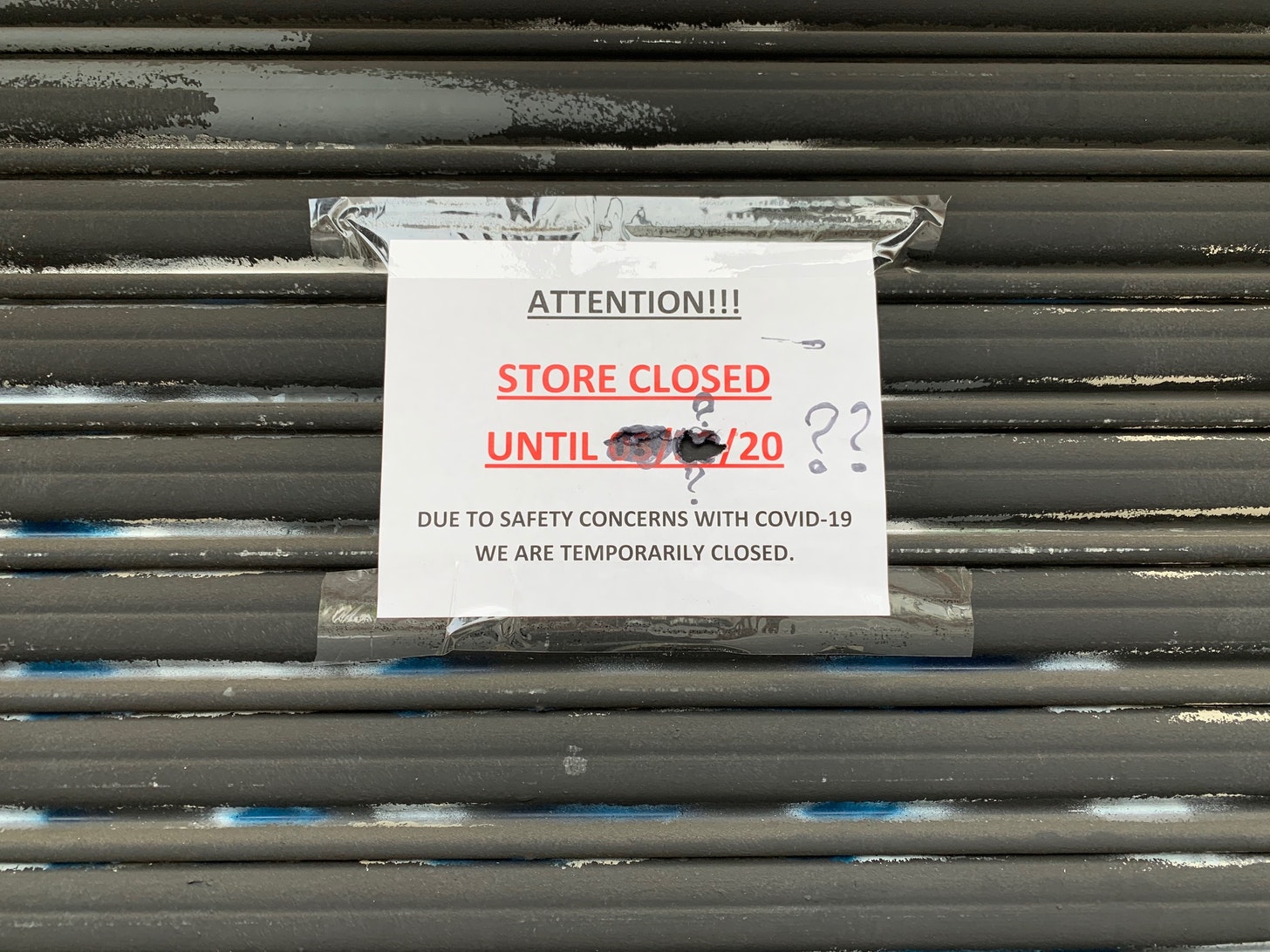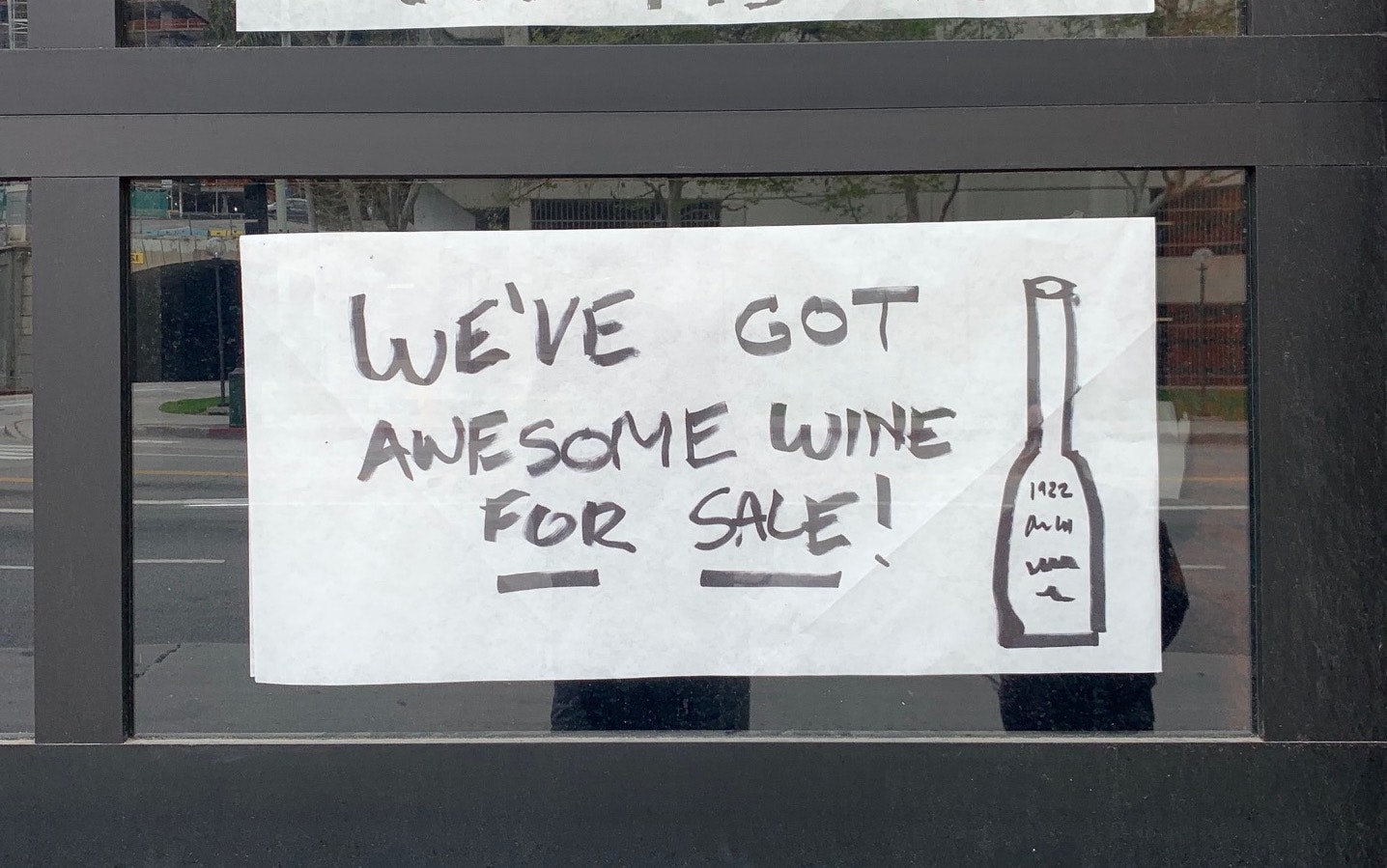Scroll to the bottom for the community update.
On a walk a few days ago, I spotted this sign on a shuttered restaurant front that I thought really captured the indeterminacy of the state we’re in:
Somebody, possibly the owner, had scratched out the speculative re-opening date and put in ?? question marks. Depending on what ?? ends up being, this store is either in hibernation, in a coma, or already dead. A big part of the answer depends on how much stored fat the owners had in the system when the pandemic hit. Your ability to endure uncertainty in planning horizons is almost entirely a function of fat reserves.
Here’s another sign on another restaurant/store, this one showing evidence of some fat in the system: wine available for sale.
Do YOU have awesome wine for sale? I have some (metaphorically speaking) that’s been aging in my cellar for a while, which I might break out and sell. We’ll see.
For normal people and organizations, planning horizons are extrinsic things they do not control. For normal people and organizations, the lack of well-defined planning horizons is a disastrous condition.
For example, restaurants have daily, weekly, and seasonal expectations of demand levels. Large companies operating in mature markets have quarterly horizons and earnings expectations. They have long-lead-time product launches and production schedules based on those expectations. For normal people and companies, the world has currently fallen apart.
For normal people and organizations, horizons are necessarily extrinsic because operating states are lean by design. Predictable flows over accumulated stocks. Just-in-time over time-banking. Inventory as inefficiency rather than creative insurance against weird conditions. Low-slack dependencies on others in a value chain assumed to be intact, over high-slack ones capable of enduring some disruption.
These expectations of normalcy have fallen apart in nearly textbook ways.
For those who have been in the gig economy for a while on the other hand, horizons are intrinsic things, largely a function of internal state.
You have a cash position. You have a burndown rate. You have certain robust expectations of “passive” income. You have accounts receivable. You have a certain limited ability to move revenue events around in time. You have a certain limited ability to take on debt, depending on your creditworthiness and eligibility for various relief programs. You have some wine available to sell. You have a certain learned flexibility in things you are willing and able to do for money. Once you run out of those structural options, your next line of defense is friends and family.
Normal in the gig economy is the ability to create and sustain a planning horizon between 2-6 months out. Far enough out to avert panic, not so far out as to induce complacency. We have this ability to create time horizons because we naturally, out of necessity rather than as a matter of strategy, run somewhat fat. We are the feral camels of natural economic deserts.
By the gig economy definition of normal, not much has changed.
Of course, a long enough desert crossing will kill any camel. But it’s nice to know that we inhabit an operating structure that was kinda built for this.
This is important: you are lean to the extent your business depends on extrinsic planning horizons. You are fragile to the extent you are lean. You are fat to the extent you can create your own horizons. You are robust to the extent you are fat.
To acquire, and retain, the ability to create your own horizons, get fat. It can feel really hard, but the good news is, the more fat you have, the more ability you have to create more fat, so store your surpluses in the coming weeks and months, even if they are very meager. Even if you have to buy time hours at a time rather than days or week (pop quiz: do you know how much your life costs to sustain, per hour? Do the math, you may be surprised).
I’m going to sound like a bit of a broken record through this pandemic, repeating the same thing in as many different ways as I can think of. Get Fat is the same idea as the idea of Cash, Control, and Community. Cash and community are two important forms of fat. Control is the ability to create your own horizons.
Community Update
Prompt of the week: Find and add a good business case study to the Covid19 Case Studies page on our Roam database (there’s several good ones there already that I recommend reading. The HEB case is particularly good).
New Gigs Available
-
DBA needed to move SQL Server 2008 to SSIS.
-
Groupmuse needs a full-stack web developer
See the Take a Gig/Leave a Gig page for details. Take or add a gig if you can.
We now have a Discord Chat Schedule and a steady lowkey stream of activity developing. There have been 5 chat sessions in the last week already. There’s a chat scheduled almost every day (there’s one tonight at 10PM hosted by Jordan), and of course you can also just show up and see if there’s someone hanging out who might want to chat. I’ll try to tweet out upcoming chats on the @artofgig account, but you may want to put a couple of the scheduled chats that fit your schedule on your calendar, so you can drop by when you are in the mood. Right now, these chats are running in trial-and-error mode, experimenting with various formats. We’ll double down on the good ones as we identify them.
Here is the Discord invite link if you haven’t joined yet.
I’ll get the community stuff organized better next week, but in the meantime, do share your ideas on the Discord. We’re taking a sort of laissez-faire approach to evolving this thing based on what people actually need and use. So trial-and-error ideas for things to experiment with are particularly welcome.

